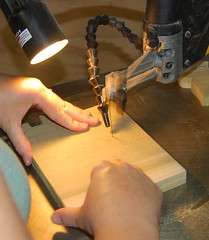In 2007 holiday shoppers were inundated with product recalls and warnings of high lead levels in scores of mass produced toys that lined big box stores. Law maker's responded to the outcry from outraged consumers with a broad, sweeping new law, the Consumer Product Safety Improvement Act (CPSIA). The new law mandates all manufactured goods intended for children under 12 certify that levels of lead and phthalates not exceed safe levels. Hair bows, onsies, dresses, burp cloths, cribs, bikes,toys, even books and electronics will need to be tested.
Sounds Like a Great Idea; What's The Problem?
Well yes, for the multi-national toy companies whose disregard for children's safety caused the collapse in consumer confidence and put children at risk in the first place, this law is probably necessary. Large companies who outsource manufacturing to emerging markets where lax or non-existant health and safety laws are on the books - or more importantly, enforced is probably the only way to ensure a repeat of the crisis experienced in 2007 does not occur. These companies can afford the additional costs and with product runs in the thousands, and even tens of thousands, the incremental costs of testing will be minimal.
But what of the independent and micro-manufactures? Handcrafters who's product runs consist of 2 or 3 at a time? The requirements, standards and costs to both are virtually the same. Both multi-million dollar company and self employed toy maker need to test each component of their product for each and every run they produce (it just so happens one can amortize the cost by thousands, over the other).
Testing is both expensive and hard to secure (there are only a dozen companies accredited by the Consumer Product Safety Council located in the USA, the bulk being located in south east Asia). Because each component of the product needs to be tested (i.e. each color of paint, each type of fabric, thread, snaps and buttons, wood etc.), costs can quickly skyrocket into the thousands. One micro manufacturer of a children's onsies received quotes that ranged from $600 - $750 for her basic bibs and onsies (products she sells for less than $20 a piece).
The Response from Small Business  Since news of the law first broke in the handmade community fear, anger and activism have been raging. Websites such as Etsy and Fashion Incubator have been ablaze with questions, comments, letter writing campaigns, and messages of support for those affected. Facebook pages, petitions and calls for the Obama administration to overturn, or at least amend the law have received support from thousands.
Since news of the law first broke in the handmade community fear, anger and activism have been raging. Websites such as Etsy and Fashion Incubator have been ablaze with questions, comments, letter writing campaigns, and messages of support for those affected. Facebook pages, petitions and calls for the Obama administration to overturn, or at least amend the law have received support from thousands.
If this law seems vague and far-reaching it turns out that was that was the intention. Lawmakers have admitted that the law was passed in broad strokes to give the agency overseeing enforcement (CPSC) a wide bearth. Essentially, the CPSC has the authority to "go after" anyone from a multi billion dollar company like Fisher Price, or a stay at home mother in Boston. And with stiff penalties of $30K per offence many small businesses are opting to err on the side of caution and close shop.
The Consumer Product Safety Commission (CPSC), the agency tasked with enforcing this law, has itself been plagued by lack of leadership and underfunding (problems which could arguably be said lead to the problem of toxic toys in the first place). How, one can reasonably ask, can this agency be expected to handle the enormous task laid before it in enforcing this law?
In addition to underfunding, the agency is operating in a power vacuum with only two of the three commissioners seated (three commissioners are needed by law for the agency to enact new rules, or to impose major fines). A six month reprieve granted to the agency by the Senate in 2007, allowing the agency to function, runs out on Feb 3rd and no appointments are pending.
The AftermathThe law seems to belie common sense and the CPSC's lack of response to the mass cry for more information has only served to fuel the fires of protest. "I want to comply with the law", many independent Etsy sellers reply, "but tell me how I can do it and stay in business." There appears not to have been any thought as to how small business would be affected by this law, and the lack of response or acknowledgement from the agency is leading to confusion and fear.
On January 5th, the two commissioners of the CPSC met to consider petitions from several organizations, including the Handmade Toy Alliance, The Fashion Jewelry Trade Association and several electronics makers to consider exemptions of materials that intrinsically are non-toxic such as undyed cotton, wood, certified organic textiles, natural gems and lead parts that are safely contained.
consider exemptions of materials that intrinsically are non-toxic such as undyed cotton, wood, certified organic textiles, natural gems and lead parts that are safely contained.
The members agreed in principal to exemptions for undyed cotton, natural gem stones and contained lead, but their ruling is only preliminary and may be altered. In fact, no further communication (to clairfy the enormous volume of questions and concerns raised by business people and parents) from the agency is not expected until after the law goes into effect, post February 10th.
On January 8th the CPSC released guidelines for resellers of children's goods, (thrift stores, consignment stores) saying essentially they were not responsible for testing goods, but they would also be held accountable should any product they sell happen to contain toxic chemicals above the new acceptable levels.
These two communications from the CPSC are a small glimmer of hope that they are listening to the avalanche of feedback they are receiving on this topic. But with the resignation of Public Affairs Director Julie Vallese, the only certainty is that an under-staffed, under-funded, secretive agency is on track to become even more so.
For More Information on the topic please visit: buyhandmade.org

Have you thought about sending this article to the letters to the editor at the Globe and other newspapers? I'm amazed at how few people outside the indie craft movement are aware of what is going on with this well intentioned but badly planned law.
ReplyDelete